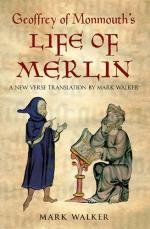|
This section contains 487 words (approx. 2 pages at 300 words per page) |

|
SOURCE: “Geoffrey of Monmouth and the Translation of Insular Historiography,” Arthuriana, Vol. 8, No. 4, Winter, 1998, pp. 42-57.
In the following essay, Robertson explains how Geoffrey distanced himself from rhetorical historians and the prevailing practices of historiography by asserting that his chronicle was a translation. Robertson also discusses the problem posed by Geoffrey's writing in Latin, a language associated in the Middle Ages with conveying the truth.
In claiming to translate his Latin history from a Celtic source, Geoffrey attempts to disrupt the received Anglo-Latin historical tradition. The divergent responses of monastic writers and secular rulers to the HRB later in the twelfth-century attest the success of his project.
(KR)
The Trojan vernacular was the most influential language never spoken in the British Isles during the Middle Ages. As one of the first (and most conspicuous) promoters of this hitherto undocumented language, Geoffrey of Monmouth has attained an ascendancy among...
|
This section contains 487 words (approx. 2 pages at 300 words per page) |

|


